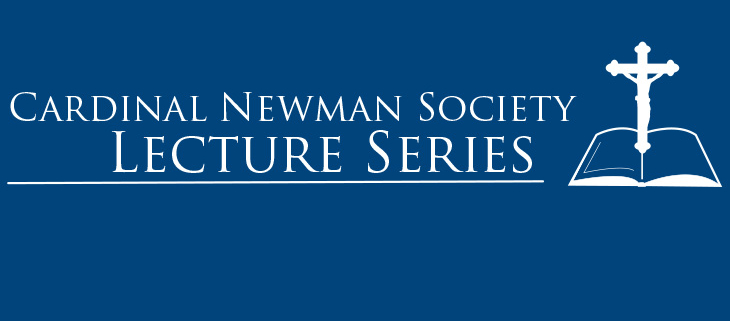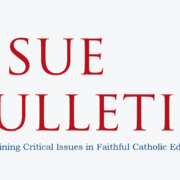Talk to Newman Guide College Presidents and Senior Staff
This talk was originally given at The Cardinal Newman Society Presidents’ Meeting in Washington, D.C. on January 20, 2016
Mr. Reilly, esteemed university presidents, dear friends in Christ,
I want to thank you for inviting me to join you for dinner this evening, and to offer a few remarks to you. This is an esteemed, august, and distinguished group, and I’m very humbled that you’ve invited me to offer a few remarks to you this evening.
I have been asked to speak to you about celebrating Catholic identity in the context of your universities and colleges. And in some ways, I feel ill equipped for that task—your institutions already represent some of the most Catholic places in our country—places where Catholic culture, intellectual life, and sacramental life flourishes in beautiful ways.
I am a graduate of a large, land-grant public university. (Rock Chalk Jayhawk!) And my diocese, the Diocese of Lincoln, does not have a Catholic university. But I do hope that I can offer a few thoughts that might be helpful to you in the important work you undertake.
I’d like to talk for a few moments about the Catholic University of Ireland, the university founded by my spiritual patron, Blessed John Henry Cardinal Newman.
Most of you know that Newman is probably the most famous English convert to the faith, a prolific writer and thinker, and most of you are very familiar with Newman’s Idea of a University. In fact, most of your institutions probably draw wisdom and guidance from Newman’s work. But you might not be as familiar with Newman’s term as the founding president of the Catholic University of Ireland. And the story might be instructive for you today.
In 1852, Newman was asked by the bishops of Ireland to be the founding rector of the Catholic University of Ireland.
He didn’t want the job. The Catholic University of Ireland was founded to compete with the anti-Catholic Queen’s University of Ireland, which forbade theology and undermined the Church’s mission. But Newman wasn’t sure the Irish bishops really understood what a Catholic university should be. He took the job, and began in 1854, only after the Holy Father asked him personally.
His first biographer, William Philip Ward, says that “the story of the next three or four years is a long drawn-out history of apparent failure.”
Newman clashed with the Irish bishops—especially Cardinal Cullen, the Archbishop of Dublin. Newman’s vision was a well-educated laity, formed in the humanities, as described in Idea of a University, which he developed as he began the project. But he felt the bishops wanted to found a sort of pre-seminary, whose sole focus would be training for future priests. They clashed over faculty appointments, curriculum, and authority. Newman felt that their promises were often broken. The bishops refused to allow him to accredit the college, which he thought it guaranteed its failure.
Newman’s work in Ireland, says Ward, “made no difference, and wasted his time.”
The clashes between Cardinal Cullen and Newman put the university in dire straits. Its enrollment was too low, its funding was unclear, and its episcopal leadership, at least from Newman’s perspective, expected him to “pick up the crumbs.”
In October of 1858, these frustrations came to a head. Cardinal Cullen had failed to approve Newman’s appointment of a vice-rector. A dean had been appointed without Newman’s approval. It was clear that he had been sidelined. In November, after a period of reflection, Newman tendered his resignation
The bishops of Ireland felt he had failed. Newman felt, in some ways, they had failed him. Some felt that he had failed the Holy Father. The faculty felt that his departure would lead to the University’s demise. And, in fact, the Catholic University of Ireland lasted only 50 years before it was absorbed in to the secular university it had originally sought to defeat.
Newman’s time in Ireland might be seen as a spectacular failure. But Newman believed that the Lord had called him there for a purpose, and had used his service there to further the Kingdom. He had honed and articulated a vision for education—and a vision for the Church—while he was in Ireland. He was now passionate about well-formed and active Catholic laity. And he believed the Lord had wanted that vision, and would use it.
He wrote to a friend. Resignation, he said, “does not prove that what I have written and planned will not take effect some time and somewhere, because it does not at once. For twenty years my book on the Arians was not heard of …
My Oxford University Sermons, preached out as long ago as seventeen years, are now attracting attention at Oxford. When I am gone something may come of what I have done at Dublin. And since I hope I did what I did not for the sake of man, not for the sake of the Irish hierarchy, not even for the Pope’s praise, but for the sake of God’s Church and God’s glory, I have nothing to regret and nothing to desire different from what is.”
The path of Providence, as he had seen before, had been dimly lit. But he believed that for all his failure, the Lord would use his work for great and beautiful good.
I want to make three points about Newman’s experience at the Catholic University of Ireland, and about your role in contemporary Catholic education.
The first point is that Providence is utilizing your faithfulness even when you cannot see it. Many of your colleges and universities are in precarious and difficult situations today. Many of you face real and clear threats because of your fidelity to the Gospel. For some of you, it is no exaggeration to say that your survival is at stake, in the face of threats to religious freedom. And some of you may wonder why the Lord is calling you to persevere in a culture so hostile to your mission and ministry. But, dear brothers and sisters, Providence is utilizing your faithfulness.
Whether your colleges are able to weather the storms, or whether you’re capsized by the winds of persecution, the Lord is utilizing your work, and calling you to faithfulness. Newman’s university did not survive. But the work that came out of his time there—especially Idea of a University—laid the groundwork for faithful and dynamic Catholic university education across the globe. The so-called “failure” of the Catholic University of Ireland was the catalyst for the good work that you’re now doing.
Newman wrote: “God has created me to do Him some definite service; He has committed some work to me which He has not committed to another. I have my mission—I never may know it in this life, but I shall be told it in the next. Somehow I am necessary for His purposes….a link in a chain, a bond of connection between persons. He has not created me for naught. I shall do good, I shall do His work.”
God has created and called your institutions to do some definite service. And in the tribulations that many of you face, you may not see what the purpose is. None of us see clearly the movement and intentions of the Holy Spirit.
But Providence lays the groundwork of the Lord’s will over time. And your work—whether blessed with worldly success or not—is guided by the hand of Providence. And the Church thanks you for your fidelity.
My second point is that our contemporary situation requires new and creative approaches to the mission of orthodox and dynamic Catholic higher education.
The Catholic University of Ireland, as Newman envisioned it, was a new approach to Catholic higher education. The idea of founding a university whose principal mission was the formation of a “well-educated laity,” seemed novel. To us, with the benefit of hindsight, the mission and methodology seems obvious. But consider that the bishops of Ireland had such difficulty envisioning the primacy of the liberal arts, and the role of lay faculty and administrators. At the time, Newman’s thoughts were considered revolutionary, and maybe even subversive.
We need a continued renaissance in our approaches to Catholic higher education. As an example, I should mention that some estimate 90% of American Catholic college students attend public universities. Some of them are poor, or new to this country, or the first in a family to attend college. Some of them are disinterested or poorly formed in the faith. Some of them are studying in programs that small colleges and universities cannot offer. And you know, far better than I, that their education and formation is not only bereft of a Catholic character, it is often hostile to the truths of the Gospel.
Catholic colleges and universities, if they are true to their mission, might spend time asking how they can support the Catholic intellectual and personal formation of these students.
My good friend Steve Minnis, president of Benedictine College, is here with us tonight. Benedictine has formed a partnership with the St. Lawrence Catholic Center to support Humanitas, a program of intellectual formation for freshman and sophomores at the University of Kansas. The University of Mary, under the leadership of Msgr. Shea, offers accredited courses at the University of Arizona.
In the Diocese of Lincoln, in partnership with our college seminary, we’ve begun the Newman Institute for Catholic Thought and Culture, which will offer accredited courses in the humanities to undergraduates at the University of Nebraska.
These partnerships and projects are not easy. They require an investment of time and financial resources. But they are evangelical, they have life-long impact on students, and they bring the mission of Catholic universities to students most in need of the Gospel. Graduates of these programs have a Catholic foundation, through which to understand their education in areas you might not offer: engineering, technology, biomedical sciences, etc.
Each of you has opportunities to serve and reach students who might never attend Cardinal Newman Society colleges. And in so doing, you’ll be instrumental in forming the network of “well-educated laity” who will build a culture of life.
My third point is that the Church needs you, even when she doesn’t realize it.
Newman bears witness to the challenges and difficulties an institution can face when the hierarchy does not understand or support its mission. He carried the feelings of mutual distrust, disappointment, and disenchantment with the local hierarchy—especially his bishop, Cardinal Cullen.
Many of the institutions represented in this room bear battle scars from difficult relationships with bishops or dioceses that have not always understood your mission. Many of you are, for understandable reasons, wary of collaboration with the local Church. But fidelity to the Gospel requires service to the universal Church and to the particular Church in which you operate. The Lord is calling you to serve the Church in precisely the places in which you are located.
And as a bishop, I can tell you that the Church, and the bishops in the United States especially, increasingly have an understanding and appreciation for what it is that you are doing.
I am 60 years old, and I’ve been a bishop for almost 8 years. There was a time when I could call myself a young bishop—but increasingly, those days have passed me by!
In dioceses across the country, bishops younger than me, with an even greater appreciation for your mission, are being entrusted with important leadership positions. And the Lord, truly, is calling you to foster and cultivate relationships with them. Ex Corde Ecclessiae calls every Catholic college to “be in close communion with the local Church and in particular with the diocesan bishops of the region or nation in which it is located.”
Newman reminds us of the importance of fostering this communion. Of course, many of you are wondering how to go about this. And some of you have better ideas than I do. But I can tell you that bishops everywhere are concerned with the ongoing formation of their priests, teachers, and lay collaborators. And bishops are eager to find partners in advocating for the faith in the public square. And of course, bishops are concerned with fostering vocations. And finally, I can tell you something that you’ll identify with—most bishops are trying to fulfill their responsibilities while recognizing the reality that there never seems to enough money to get things done!
I’m being sincere when I say that your bishops are in need of the work that you’re doing. And I’m sincere when I say that many of you will experience real and authentic openness to communion and collaboration.
The question for you to consider is what service you can offer to the needs of the particular Church. Can you foster an interest in vocations to the diocesan priesthood, among your students and among other young men? Can you offer training and educational opportunities for diocesan priests, teachers, and leaders? Can you develop authentically Catholic schools of education? Can your accounting and finance faculty offer workshops on parish management and finance for pastors? Can you be a voice for the richness of the Church’s life in your own dioceses?
In the face of ever-greater secularization, bishops are searching for partners. And they’re eager for help. Now, more than ever, the imperative of communion with the local Church is critical to your success, and to the success of the Church’s mission.
Providence is guiding your work, dear brothers and sisters, even in the face of trials and difficulties. Providence is leading even when you cannot see the outcome. You can be at the forefront of continued renaissance in faithful Catholic higher education. You can be of great service to the particular Church. And you can be, and will be, blessed abundantly by the Father for your fidelity and generosity to the Gospel.
Thank you for your good work. May almighty God bless you, +




